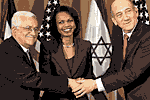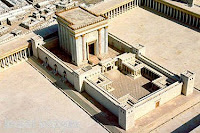ISRAEL PULLS OUT OF LEBANON
Israel Quits Lebanon Leaving Hizballah Back in the Saddle under UN Auspices:
DEBKAfile Special Military Report
October 1, 2006, 10:55 AM (GMT+02:00)
DEBKAfile’s military sources saw the Iast Israeli soldier quit Lebanon before dawn of Oct. 1, Yom Kippur eve, leaving in captivity Ehud Goldwasser and Eldad Regev, the two soldiers whose abduction by Hizballah provoked the 34-day Lebanon war on July 12.
Only one third of the 15,000 international peacekeepers the UN Security Council pledged for an expanded UNIFIL has in fact been deployed in South Lebanon. And even that paltry force has made no effort to stop Hizballah restoring its presence and replenishing its stocks of rockets and missiles to points in South Lebanon within firing range of Israel. In most ways, therefore, UN Security Council Resolution 1701 of Aug. 14 is a dead letter.
While withdrawing the bulk of its force gradually, Israel kept the last units behind in a futile effort to persuade UNIFIL commanders to uphold key provisions of the resolution. They refused even the minimal demand to restrict Hizballah’s military movements along the Israeli border. They claimed they could only act with the permission of the Lebanese government. By finally giving way on this point, the Israeli government accepted the determination that UNIFIL is the instrument of the Lebanese government - not the enforcer of UN resolutions or Israeli security.
This concession makes nonsense of the claim that the most important gain of the Lebanon operation was the removal of Hizballah’s fighting forces from access to the Israeli border. This claim was made in a desperate attempt by Israeli prime minister Ehud Olmert, defense minister Amir Peretz and chief of staff Lt.-Gen Dan Halutz, to justify the war and its losses.
Looking slightly further ahead, Israel’s policy-makers had better hurry up and form a plan to meet an exacerbated threat from Lebanon, the possible displacement of the Fouad Siniora government in Beirut with a pro-Syrian, Hizballah-dominated administration. This further deterioration in Israel’s national security situation is far from being a remote hypothesis.
Hizballah leader Hassan Nasrallah used the war to forge alliances with the Lebanese parliamentary speaker Nabih Berri, head of the rival Shiite movement Amal, and the Christian Maronite strongman Michel Aoun. This bloc intends to make a bid to install a pro-Syrian government after Ramadan is over next month.
Our sources in Beirut report a last-minute US-French initiative to frustrate this development. Siniora had his interior minister Ahmed Fatfat posted decree No. 2403 for Lebanon’s five intelligence and security agencies to pool their intelligence data and so provide his government and national army with the means of asserting control over national security. Two pro-Syrian officers, General Security chief Wafic Jezzini, and Director-General of Internal Security forces, Maj.-Gen Ashraf Rifi, stamped hard on this decree. The Siniora government was thus denied a key resource for dominating the country at large, not just the South, and is more vulnerable than ever to a hostile push.
As for Israel’s policy-makers, their handling of the bargaining with UNIFIL was as muddled, vacillating and feeble as their conduct of the Lebanon war itself. By accepting the Aug. 14 truce, they agreed to handing over the Lebanese-Israeli border to an international peacekeeping force without teeth; its rules of engagement are so constrictive that without Lebanese government authorization its members may not fire a single shot - even when necessary to prevent Hizballah moving back to its former aggressive positions or smuggling in fresh supplies of weapons – both of which are out-and-out violations of the same Resolution 1701 which mandated its own deployment.
By removing its troops in keeping with that same resolution, Israel has bargained away its last option for extracting information about the fate of the two soldiers seized by Hizballah; Red Cross access has brusquely refused.
In the view of DEBKAfile’s political sources, the last IDF units were kept in Lebanon after the truce for no discernible military or diplomatic purpose but to lull the Israeli public into not looking too closely at their leaders’ feeble negotiating stance and assuming Israel was still a strong player on the Lebanese scene. By Yom Kippur eve, most people were caught up in seasonal pursuits and less inclined to continue their painful in-depth calculation of the war’s net results.
Those results can be summed up in four negative developments which the Olmert government failed to thwart:
1. The wholesale smuggling through Syria of fresh weapons supplies to Hizballah from Syria and Iran, which neither the Lebanese army nor UNIFIL is lifting a finger to stop despite an explicit UN embargo. The heads of Israel’s government neglected to draw lessons from the failed deal on the Gaza crossings and the Philadelphi route, which never prevented arms flowing freely from Egyptian Sinai to Palestinian terrorists, notably the ruling Hamas.
Syria stays technically in the clear of the UN arms embargo by setting up huge arms dumps on its border with Lebanon, ready to be pushed across at a moment’s notice by land.
2. Expanded UNIFIL, which Israeli foreign minister Tzipi Livni did her best to present as a force with teeth, rather than monitoring Hizballah’s movements and disarming its combatants, is busy monitoring the feuds of Lebanese political and military factions.
3. These international units refrain from entering S. Lebanese villages. There is therefore no hindrance to Hizballah re-occupying those villages and restoring its strongholds within range of the Israeli border. The UN force is not setting up checkpoints to control banned traffic in the South. At best, the units are using makeshift roadblocks which go up for an hour at most before being removed and leaving Hizballah a free field for moving around the South.
4. The naval blockade against illegal arms imports, purportedly maintained by French, Italian, German and Greek war vessels, is about effective as UNIFIL’s ephemeral roadblocks. Their governments consented to the vessels being barred from entering Lebanese territorial waters. And so a strip of ocean 12 miles wide up to the Lebanese coast remains wide open for Hizballah’s arms ships to freely ply the route between Syrian and Lebanese ports.
Anxious to turn disaffected popular attention away from Hizballah’s recovery under the benign auspices of the UN’s European contingents, Israeli ministers and military chiefs have been debating out loud the need to carry out a major ground operation in the Gaza Strip, whence Qassam missiles continue to be fired into Israeli communities and where the Palestinians are building up their arms stocks, unhindered by international monitors and Egyptian police.
Related articles:
Israel’s Real Danger
European Lebanon Force Is Cast as Shield for Iranian-Hizballah Military Buildup
Nasrallah Is Already Carving out Lebanon’s Future
Link
DEBKAfile Special Military Report
October 1, 2006, 10:55 AM (GMT+02:00)
DEBKAfile’s military sources saw the Iast Israeli soldier quit Lebanon before dawn of Oct. 1, Yom Kippur eve, leaving in captivity Ehud Goldwasser and Eldad Regev, the two soldiers whose abduction by Hizballah provoked the 34-day Lebanon war on July 12.
Only one third of the 15,000 international peacekeepers the UN Security Council pledged for an expanded UNIFIL has in fact been deployed in South Lebanon. And even that paltry force has made no effort to stop Hizballah restoring its presence and replenishing its stocks of rockets and missiles to points in South Lebanon within firing range of Israel. In most ways, therefore, UN Security Council Resolution 1701 of Aug. 14 is a dead letter.
While withdrawing the bulk of its force gradually, Israel kept the last units behind in a futile effort to persuade UNIFIL commanders to uphold key provisions of the resolution. They refused even the minimal demand to restrict Hizballah’s military movements along the Israeli border. They claimed they could only act with the permission of the Lebanese government. By finally giving way on this point, the Israeli government accepted the determination that UNIFIL is the instrument of the Lebanese government - not the enforcer of UN resolutions or Israeli security.
This concession makes nonsense of the claim that the most important gain of the Lebanon operation was the removal of Hizballah’s fighting forces from access to the Israeli border. This claim was made in a desperate attempt by Israeli prime minister Ehud Olmert, defense minister Amir Peretz and chief of staff Lt.-Gen Dan Halutz, to justify the war and its losses.
Looking slightly further ahead, Israel’s policy-makers had better hurry up and form a plan to meet an exacerbated threat from Lebanon, the possible displacement of the Fouad Siniora government in Beirut with a pro-Syrian, Hizballah-dominated administration. This further deterioration in Israel’s national security situation is far from being a remote hypothesis.
Hizballah leader Hassan Nasrallah used the war to forge alliances with the Lebanese parliamentary speaker Nabih Berri, head of the rival Shiite movement Amal, and the Christian Maronite strongman Michel Aoun. This bloc intends to make a bid to install a pro-Syrian government after Ramadan is over next month.
Our sources in Beirut report a last-minute US-French initiative to frustrate this development. Siniora had his interior minister Ahmed Fatfat posted decree No. 2403 for Lebanon’s five intelligence and security agencies to pool their intelligence data and so provide his government and national army with the means of asserting control over national security. Two pro-Syrian officers, General Security chief Wafic Jezzini, and Director-General of Internal Security forces, Maj.-Gen Ashraf Rifi, stamped hard on this decree. The Siniora government was thus denied a key resource for dominating the country at large, not just the South, and is more vulnerable than ever to a hostile push.
As for Israel’s policy-makers, their handling of the bargaining with UNIFIL was as muddled, vacillating and feeble as their conduct of the Lebanon war itself. By accepting the Aug. 14 truce, they agreed to handing over the Lebanese-Israeli border to an international peacekeeping force without teeth; its rules of engagement are so constrictive that without Lebanese government authorization its members may not fire a single shot - even when necessary to prevent Hizballah moving back to its former aggressive positions or smuggling in fresh supplies of weapons – both of which are out-and-out violations of the same Resolution 1701 which mandated its own deployment.
By removing its troops in keeping with that same resolution, Israel has bargained away its last option for extracting information about the fate of the two soldiers seized by Hizballah; Red Cross access has brusquely refused.
In the view of DEBKAfile’s political sources, the last IDF units were kept in Lebanon after the truce for no discernible military or diplomatic purpose but to lull the Israeli public into not looking too closely at their leaders’ feeble negotiating stance and assuming Israel was still a strong player on the Lebanese scene. By Yom Kippur eve, most people were caught up in seasonal pursuits and less inclined to continue their painful in-depth calculation of the war’s net results.
Those results can be summed up in four negative developments which the Olmert government failed to thwart:
1. The wholesale smuggling through Syria of fresh weapons supplies to Hizballah from Syria and Iran, which neither the Lebanese army nor UNIFIL is lifting a finger to stop despite an explicit UN embargo. The heads of Israel’s government neglected to draw lessons from the failed deal on the Gaza crossings and the Philadelphi route, which never prevented arms flowing freely from Egyptian Sinai to Palestinian terrorists, notably the ruling Hamas.
Syria stays technically in the clear of the UN arms embargo by setting up huge arms dumps on its border with Lebanon, ready to be pushed across at a moment’s notice by land.
2. Expanded UNIFIL, which Israeli foreign minister Tzipi Livni did her best to present as a force with teeth, rather than monitoring Hizballah’s movements and disarming its combatants, is busy monitoring the feuds of Lebanese political and military factions.
3. These international units refrain from entering S. Lebanese villages. There is therefore no hindrance to Hizballah re-occupying those villages and restoring its strongholds within range of the Israeli border. The UN force is not setting up checkpoints to control banned traffic in the South. At best, the units are using makeshift roadblocks which go up for an hour at most before being removed and leaving Hizballah a free field for moving around the South.
4. The naval blockade against illegal arms imports, purportedly maintained by French, Italian, German and Greek war vessels, is about effective as UNIFIL’s ephemeral roadblocks. Their governments consented to the vessels being barred from entering Lebanese territorial waters. And so a strip of ocean 12 miles wide up to the Lebanese coast remains wide open for Hizballah’s arms ships to freely ply the route between Syrian and Lebanese ports.
Anxious to turn disaffected popular attention away from Hizballah’s recovery under the benign auspices of the UN’s European contingents, Israeli ministers and military chiefs have been debating out loud the need to carry out a major ground operation in the Gaza Strip, whence Qassam missiles continue to be fired into Israeli communities and where the Palestinians are building up their arms stocks, unhindered by international monitors and Egyptian police.
Related articles:
Israel’s Real Danger
European Lebanon Force Is Cast as Shield for Iranian-Hizballah Military Buildup
Nasrallah Is Already Carving out Lebanon’s Future
Link





















0 Comments:
Post a Comment
<< Home